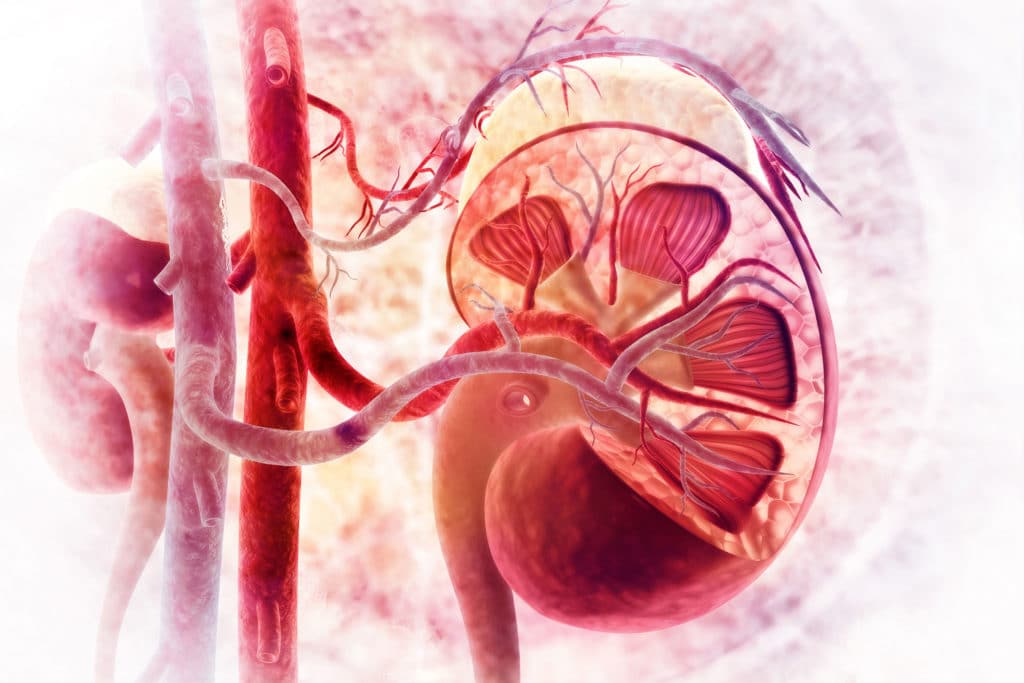In the case of a potassium surplus, in the technical language of Hyperkalemia is increased with the potassium levels in the blood. For this, various causes may be responsible. Symptoms usually occur only when the potassium excess is massive. This is not the case, it may be a Hyperkalemia is quite a chance finding in the context of an advanced blood test. Before we talk about too Much potassium, we only look at the tasks of potassium in the human body.
Table of contents
Potassium is one of the most important minerals in the human body. Approximately 98 percent of which are in the Interior of the cells, the Rest is extracellular. Potassium is mainly used for the production of energy is important. Potassium should always be in sufficient quantity in the body, so that a normal function of the cells is ensured. This mineral is important for the electrical processes in the cells, for the work of the nerves, whose excitability and the function of the muscles. Also, the acid-base balance and the water balance of the organism are dependent on potassium. Both a potassium surplus, as well as a potassium deficiency may limit the functions of the body, in the worst case, this can be life-threatening.

Furthermore, potassium in Conjunction with sodium for the maintenance of the osmotic pressure between the Interior and the Exterior of the cell. Thus, the cells of the heart muscle to function properly, they depend on this important mineral. Small changes in the amount of Potassium in the blood can already call out a fault in the electrical excitability and conditions and heart rhythm disorders.
Potassium in food
The potassium requirement is usually covered by a well-balanced diet. Especially a lot of potassium include fruit (especially bananas), dried fruit, vegetables, nuts, wholegrain products, cocoa and chocolate. In the following table you can find foods that are particularly high potassium content is known.

Causes of increased potassium in the blood
Causes of excess Potassium in the blood are primarily diseases of the kidneys in which the Excretion capacity of the kidneys is restricted, such as, for example, in the case of renal failure.
Acute cell damage are some of the causes, such as, for example, in the case of
- Burns,
- Attacks
- or Ischemia (insufficient supply of organs with blood).
Also some medications can be “debt” to a Hyperkalemia. These include, among other things,
- ACE inhibitors,
- Potassium-sparing diuretics,
- Beta-blockers
- and digitalis glycosides.
In Healthy increased potassium intake is through food hardly possible. This looks different in the Presence of renal insufficiency. Other causes a ketoacidosis, which can develop in the context of a Diabetes mellitus disease, and a massive muscle disintegration, for example, by Trauma are triggered. Furthermore, the two endocrine disorders Hypocortisolismus (lack of Cortisol in the framework belong to one of the possible causes of adrenal insufficiency) and the Hypoaldosteronism (deficiency of aldosterone). In everyday life common cause for the finding of Hyperkalemia is when the Blood draw jammed the blood for too long or too thin needle was used.

Symptoms
A slight potassium excess usually causes no symptoms. Eventually, the Affected will feel a weakness in a muscle. Among the General complaints
- Fatigue,
- Aversion,
- Weakness,
- General malaise,
- Confusion
- and diarrhea.
This neuro-coming weakness, muscular symptoms such as muscle, abnormal sensations in the arms and/or legs, and a furry tongue, to paralysis. Symptoms that affect the heart, slow heart beat and heart rhythm disturbances, in the worst case, a heart threatens a standstill. Furthermore, it is a metabolic acidosis, metabolic Acidosis, possible.
Diagnosis
The diagnosis of Hyperkalemia is made by a blood examination, the content of sodium, potassium, calcium and chloride in the blood is measured and the pH value is determined. A detailed medical history, a physical examination and an ECG are also part of such an investigation. It is important, in the case of already existing diseases in the list of medications to be clarified, since Yes, the a or other means, can lead, as already mentioned, to a potassium excess. A kidney disease, consists of symptoms such as ringing in the ears or muscle weakness must be clarified. In the case of muscle twitching, and cardiac arrhythmias it is essential to consult a doctor.
Treatment
First of all, the treatment of the underlying disease. Possibly the exogenously must be due to the supplied amount of potassium, due to an incorrect diet, reduces. Drugs that are to blame for the excess Potassium, be discontinued under medical supervision, or changed. Greatly increased potassium in the blood is a case for the ICU, there may develop a life-threatening Situation. With medication is attempted, the excretion of the kidney and the uptake of Potassium into the cells to stimulate. Insulin and Glucose to stimulate intracellular uptake of Potassium. A calcium infusion may prevent heart rhythm disorders. If nothing helps, is a blood wash, the medium of choice.

Summary
A potassium excess is very rare. However, this is the case, symptoms which corroborate the suspected Hyperkalemia, absolutely serious and medically cleared. This is especially true for older patients who suffer from kidney disease and, possibly, additional medication. If an underlying disease is present and, in addition, various drugs are prescribed, this can possibly lead to drug interactions. Extreme caution is required. (sw)
